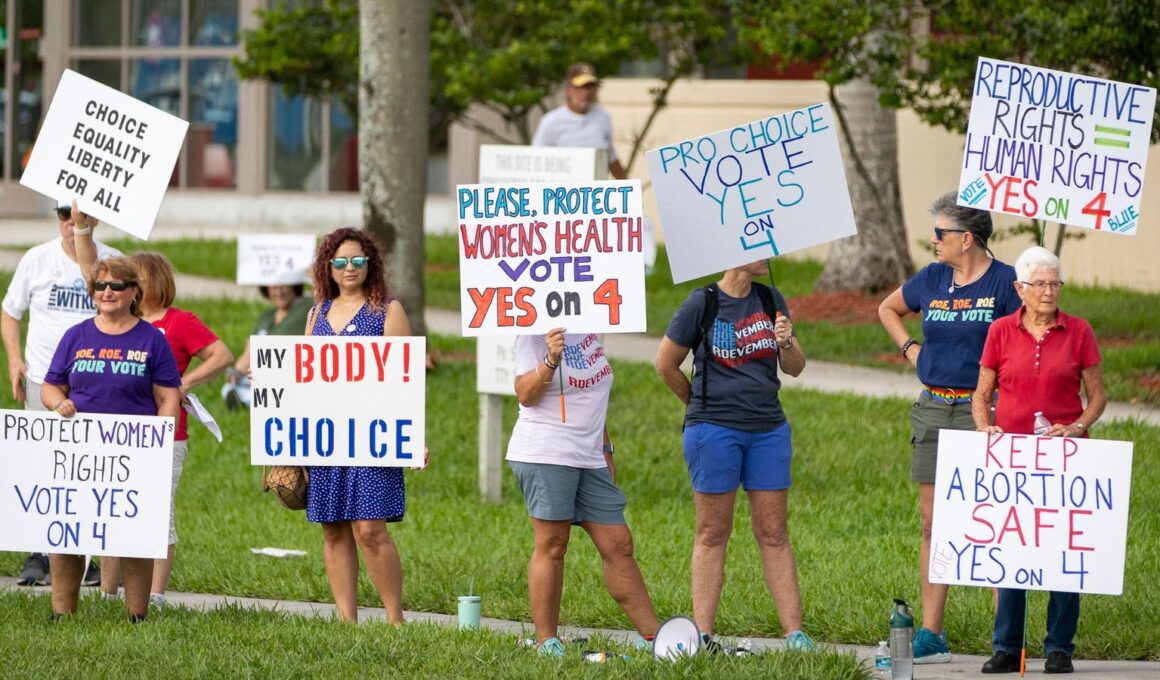Topline
A ballot measure on legalizing abortion in Missouri officially qualified for the ballot Tuesday, less than a day after a similar measure was made official in Arizona, two of eight states that are now set to have abortion on their November ballot—including some where the procedure is now banned.
Abortion rights supporters rally in West Palm Beach, Florida, on June 24.
Key Facts
Arizona: Proposition 139, if approved, would create a “fundamental right to abortion” in the state Constitution, which prohibits the state from banning abortion before a fetus is viable—around 24 weeks into a pregnancy—and allows abortions after that point if deemed necessary “to protect the life or health of the pregnant individual.”
Colorado: The state’s Right to Abortion proposal would amend the state Constitution to add the right to an abortion, and would specify the state cannot deny health insurance coverage for abortion.
Florida: Amendment 4, if approved, would amend the state’s Constitution to make clear no law “shall prohibit, penalize, delay, or restrict abortion before viability or when necessary to protect the patient’s health,” though it would not affect existing state laws requiring parents or guardians to be notified in the case of minors having abortions.
Maryland: The state’s Right to Reproductive Freedom amendment would add language to the state Constitution stating people “have the right to reproductive freedom,” which includes but isn’t limited to “decisions to prevent, continue or end one’s own pregnancy.”
Missouri: Also titled the Right to Reproductive Freedom amendment, Missouri’s measure would specify in the state Constitution that the state cannot interfere with a person’s “fundamental right to reproductive freedom” or prosecute anyone for having an abortion or aiding in one, though it does allow the state to ban abortion after the point of fetal viability, except for medical emergencies.
Nevada: The Right to Abortion Initiative would add language to the state Constitution guaranteeing the “fundamental right to abortion performed or administered by a qualified health care practitioner until fetal viability, or when needed to protect the life or health of the pregnant patient,” without state interference.
New York: The Equal Protection of Law amendment would more broadly amend the anti-discrimination language in New York’s Constitution to add protections from discrimination based on “ethnicity, national origin, age, disability, and sex, sexual orientation, gender identity, gender expression, pregnancy, pregnancy outcomes, and reproductive healthcare and autonomy.”
South Dakota: Amendment G would expand when abortion is lawful in South Dakota, allowing abortion without any restrictions within the first trimester of a pregnancy, abortion in the second trimester only when the reason for the abortion “is reasonably related to the physical health” of the pregnant person, and abortion in the third trimester only when determined by a physician to be necessary to the pregnant person’s life or health.
Get Forbes Breaking News Text Alerts: We’re launching text message alerts so you’ll always know the biggest stories shaping the day’s headlines. Text “Alerts” to (201) 335-0739 or sign up here.
How Would The Ballot Measures Affect State Abortion Bans?
Abortion is currently totally banned in Missouri and South Dakota, meaning the ballot measures in those states would overturn the bans if they’re approved and restore abortion access. They would also have an impact in Florida, which bans abortion after six weeks, and Arizona, where abortion is banned after 15 weeks. Abortion is still legal in Colorado, Maryland, Nevada and New York, but enshrining the protections in state law would ensure legislators can’t impose bans in the future. Approximately 20 states now have some form of abortion ban in place.
What To Watch For
More states could still follow suit and add abortion to their ballots. Measures are still pending in Montana and Nebraska, which are awaiting approval after organizers submitted the required number of signatures. Arkansas’ potential ballot measure remains tied up in court, after the state initially rejected the ballot measure application for paperwork issues and organizers then sued the state.
Chief Critics
Abortion ballot measures have been met with significant resistance by GOP politicians and anti-abortion rights advocates in the states where they’ve been considered and approved. Anti-abortion groups have gone to court to challenge technical issues with applications, signatures received in support of the measures, the wording of various proposals and other alleged issues, telling Politico in July their aim was to block the measures from making the ballot. “We are working to make sure it doesn’t get on the ballot in the first place,” Jill Norgaard, a board member of Arizona Right to Life and former member of the Arizona House of Representatives, told the outlet about the state’s ballot measure before it was approved.
Big Number
85%. That’s the share of U.S. adults who think abortion should be legal in at least some circumstances, according to Gallup polling released in May. A Public Religion Research Institute poll released in May found residents in all but five states believe abortion should be at least mostly legal—though those five states include South Dakota, where only 47% reported supporting abortion rights ahead of the ballot measure this fall.
Tangent
Among the people who will vote on Florida’s abortion ballot measure is former President Donald Trump, who has said he believes abortion should be left up to the states. The ex-president has so far declined to publicly say how he plans to vote on the ballot measure, however, claiming at a press conference earlier in August he’s “gonna actually have a press conference on that at some point in the near future, so I don’t want to tell you now.”
Key Background
Abortion ballot measures have emerged as a successful way to protect abortion rights in the past two years since the Supreme Court overturned Roe v. Wade, setting off a wave of state-level bans. While Republican legislators have been eager to ban the procedure, abortion rights supporters have used ballot measures to harness public support in favor of abortion, hamstringing lawmakers from imposing restrictions in even some Republican-leaning states. Kansas was the first state to put abortion on the ballot in August 2022, with 59% of voters opposing a measure that would have paved the way for abortions to be restricted. Five states then had abortion-related measures on the ballot in the 2022 midterms— California, Kentucky, Michigan, Montana and Vermont—with Ohio following suit last year. All votes have broken in favor of abortion rights.
Further Reading







